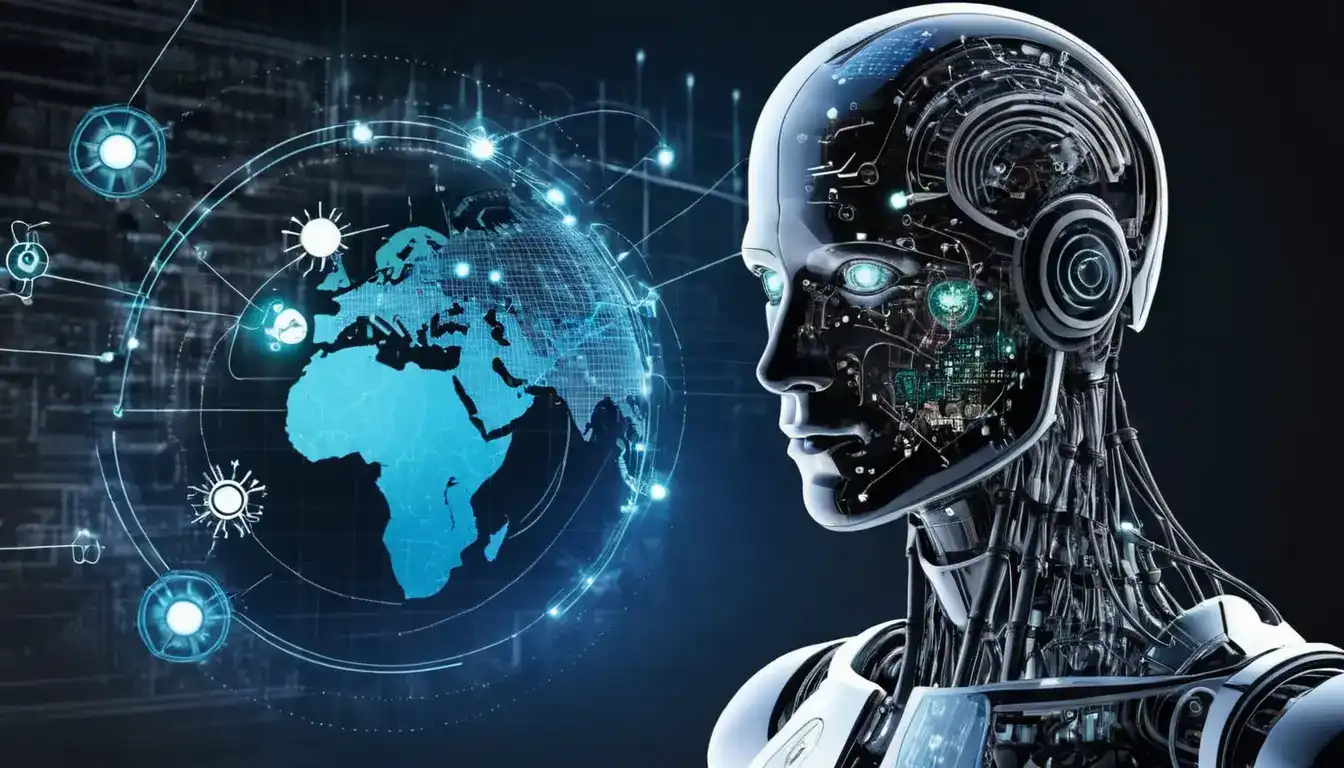Innovation and Resilience: Navigating Economic Uncertainty
Emily Willis

Photo: Innovation and Resilience: Navigating Economic Uncertainty
In today's dynamic economic landscape, characterized by rapid changes and unforeseen challenges, the concepts of innovation and resilience have become more crucial than ever. Businesses and economies worldwide are constantly navigating through uncertainties, seeking ways to adapt, thrive, and sustain growth amidst adversity.
The Importance of Innovation
Innovation serves as a cornerstone for progress and competitiveness in any economic environment. It involves the creation and implementation of new ideas, processes, products, or services that drive positive change and meet evolving market needs. During times of uncertainty, innovation becomes a powerful tool that enables businesses to pivot, respond to new demands, and capitalize on emerging opportunities.
Innovation is not merely about technological advancements; it encompasses a broader spectrum of creativity and problem-solving across various sectors. For instance, in the face of economic downturns or disruptions, innovative business models can redefine how companies operate, deliver value to customers, and sustain profitability. This adaptability is key to staying relevant and resilient in volatile markets.
Building Resilience Amid Economic Challenges
Resilience complements innovation by fostering the ability to withstand shocks and bounce back stronger from setbacks. It involves strategic planning, risk management, and operational flexibility to maintain stability and continuity in adverse conditions. Resilient organizations anticipate potential disruptions, diversify their resources, and establish robust contingency plans to mitigate impacts.
During periods of economic uncertainty, resilient businesses focus on enhancing their financial health, optimizing operational efficiency, and nurturing strong relationships with stakeholders. They invest in employee training and development, foster a culture of adaptability, and leverage technology to streamline processes and improve decision-making.
Case Studies in Innovation and Resilience
To illustrate the symbiotic relationship between innovation and resilience, consider the following examples:
Tech Startups in a Pandemic: Many technology startups swiftly adapted their offerings during the COVID-19 pandemic. Companies that originally provided services for in-person interactions quickly pivoted to virtual solutions, such as remote work tools, telemedicine platforms, and online education technologies. This agility not only sustained their operations but also accelerated their growth in new market segments.
Manufacturing Innovations: In the manufacturing sector, companies implemented automation and advanced robotics to optimize production processes and reduce dependency on manual labor. Such innovations not only improved efficiency but also minimized operational disruptions caused by labor shortages or supply chain disruptions.
Financial Sector Resilience: Banks and financial institutions strengthened their resilience by enhancing cybersecurity measures, diversifying investment portfolios, and adopting digital banking solutions. These initiatives enabled them to maintain customer trust, ensure financial stability, and navigate through economic downturns with greater confidence.
Strategies for Enhancing Innovation and Resilience
To foster a culture of innovation and resilience within your organization, consider the following strategies:
Encourage Creativity: Create avenues for brainstorming and idea generation among employees. Foster a supportive environment where innovative ideas are welcomed and celebrated.
Invest in Technology: Embrace digital transformation initiatives that enhance operational efficiency, improve customer experiences, and enable data-driven decision-making.
Build Strategic Partnerships: Collaborate with industry peers, research institutions, and startups to explore new opportunities, share resources, and mitigate risks collectively.
Prioritize Continuous Learning: Invest in employee training programs that cultivate skills in critical thinking, problem-solving, and adaptability. Equip your workforce with the tools and knowledge needed to thrive in changing environments.
Conclusion
In conclusion, navigating economic uncertainty requires a proactive approach that combines innovation and resilience. By fostering a culture of continuous improvement, embracing technological advancements, and prioritizing strategic planning, businesses can not only survive but also thrive in turbulent times. Remember, the ability to innovate and adapt is not just a response to challenges—it's a mindset that propels organizations towards sustainable growth and long-term success.
Latest ✨
View AllLuxury cruises offer a heightened travel experience with impeccable service, luxurious accommodations and carefully crafted itineraries. These cruises strike the perfect balance between leisure and exploration, with destinations that include the Mediterranean, Caribbean, Alaska, Norwegian Fjords and South Pacific Islands.
Emily Willis
Cloud computing is essential for modern businesses, offering cost savings, scalability, and improved collaboration. Implementing cloud computing requires careful planning to ensure safety and efficiency. Tips for safe and efficient implementation include conducting a needs assessment, choosing the right cloud service model, prioritizing security, planning for data migration, optimizing costs, training your team, implementing backup and recovery solutions, monitoring performance, planning for scalability, and staying updated with industry trends.
Emily Willis
The stock market is a crucial component of the global economy, providing a platform for capital formation, investment, and wealth creation. Understanding stock market movements, including bull and bear markets, market volatility, and factors influencing stock prices, is essential for investors, businesses, and policymakers. Economic, financial, and behavioral factors all play a role in shaping stock market dynamics.
Emily Willis
productivity in the workplace and provides a comprehensive guide to enhancing productivity. It covers topics such as understanding productivity styles, creating a productive workspace, time management, overcoming distractions, enhancing motivation and energy levels, effective task management, collaborating and delegating tasks, utilizing technology for productivity, and maintaining work-life balance.
Emily Willis
Business
View All
August 5, 2024
Effective Marketing Strategies to Increase Your Business Saleseffective marketing strategies in today's competitive marketplace. It discusses the significance of understanding the target audience, building a strong brand identity, and implementing various marketing tactics to increase sales. Specific strategies such as video marketing, influencer marketing, optimizing customer experience, embracing omnichannel marketing, tracking performance, staying updated on trends, and continuous improvement are highlighted.
Emily Willis

August 4, 2024
How to Build a Strong Brand Identity for Your BusinessBuilding a strong brand identity is essential for business success as it helps differentiate you in the market, connect with your audience, and build loyalty. Key steps include understanding your target audience, defining your mission and values, developing a unique selling proposition, creating a memorable brand name and logo, choosing brand colors and typography, crafting a brand voice and messaging, ensuring a consistent brand experience, leveraging visual content.
Emily Willis

August 5, 2024
Tips for Finding the Right and Profitable Business Ideasteps to finding a profitable business idea, including understanding your passions and skills, solving problems, conducting market research, finding a niche, leveraging your network, brainstorming, testing and validating your idea, staying updated on trends, evaluating market potential, validating your idea with customers, evaluating financial viability, protecting intellectual property, seeking guidance and support, and being prepared to adapt and evolve.
Emily Willis
Economy
View AllThe world of international trade is facing disruption due to rising protectionism, geopolitical tensions, technological advancements, shifting consumer preferences, and the rise of e-commerce. This has led to higher prices for consumers, disrupted supply chains, job losses, and reduced economic growth.
Read MoreCryptocurrencies are digital assets that operate on a decentralized system called blockchain. They offer potential benefits such as faster and cheaper transactions, enhanced security, financial inclusion, transparency, and a hedge against inflation. However, they also come with risks such as volatility, regulatory uncertainty, security concerns, environmental impact, and potential for illicit activities.
Read MoreBest Secured Loans for Debt Consolidation with Low Interest Rates | Compare Top Lenders & Save Money on Monthly Payments
Read MoreEntertainment
View All
August 4, 2024
The Future of Cinema: Trends in Film Production, Distribution, and Audience Engagementthe ever-evolving landscape of cinema, driven by technological advancements, changing audience preferences and innovative storytelling approaches. The exhibition explores trends such as digital filmmaking, virtual production, the dominance of streaming services, hybrid release models, and the revitalization of cinemas.
Emily Willis

August 4, 2024
Profiles of Famous Artists Who Inspire the Younger Generationthe inspirational aspects of famous artists such as Vincent van Gogh, Frida Kahlo, Pablo Picasso, Banksy, Yayoi Kusama, Jean-Michel Basquiat, Georgia O'Keeffe, Andy Warhol, Kehinde Wiley, and Ai Weiwei. It highlights their perseverance, innovation, authenticity, social commentary, mental health advocacy, and representation, among other qualities, and how these aspects continue to inspire young artists to pursue their creative dreams.
Emily Willis

August 5, 2024
Music Universal Language: Connecting and Inspiring Across CulturesMusic has the power to transcend language barriers and connect people on a deep emotional level. It serves as a bridge between cultures, fostering understanding and appreciation for diversity. The universality of rhythm and melody creates a sense of unity, while the diversity of musical styles allows for exploration and creativity.
Emily Willis
Health
View Allsignificance of mental health awareness in today's fast-paced world. It discusses the importance of understanding mental health, breaking down stigma, and promoting positive mental health practices.
Emily Willis
Maintaining good health involves a balanced diet that provides essential nutrients for the body. A balanced diet includes carbohydrates, proteins, fats, vitamins, minerals, fiber, and water. Benefits of a balanced diet include enhanced energy levels, improved mental health, a stronger immune system, better weight management, reduced risk of chronic diseases, and enhanced digestion. Components of a balanced diet include fruits and vegetables, whole grains, protein sources, dairy or dairy alternatives, and healthy fats. Tips for maintaining a balanced diet include planning meals, portion control, staying hydrated, limiting processed foods, eating mindfully, and including physical activity.
Emily Willis
In today's fast-paced world, stress, anxiety, and depression are common mental health challenges that can affect our overall well-being. Understanding these issues and taking steps to manage them is important. Strategies for managing mental health include prioritizing self-care, practicing mindfulness and relaxation techniques, challenging negative thoughts, connecting with others, developing healthy coping mechanisms, managing time effectively, and seeking professional help when needed.
Emily Willis
Trending 🔥
View All
1
2
3
6
7
8
9
10
Sports
View AllAugust 5, 2024
Inclusive Playing Field: Creating a Welcoming and Accessible Sports Environment
Read MoreAugust 4, 2024
The Importance of Mental Training and Psychological Strategies in Helping Athletes Reach Their Peak Performance on the Field
Read MoreAugust 5, 2024
Sportsmanship in the Spotlight: Cultivating Respect, Integrity, and Ethical Behavior
Read MoreTechnology
View All
August 5, 2024
Best AR Translation Apps Tested
Uncover the best AR translation apps on the market through our in-depth testing and reviews. From seamless voice conversations to real-world text translation, these apps will revolutionize the way you communicate across languages.

August 5, 2024
AI Applications that are Changing the World Around Us
Artificial Intelligence (AI) is no longer a concept from science fiction, but a reality that is reshaping the world around us. From virtual assistants to self-driving cars, AI is making significant impacts in various industries such as healthcare, education, transportation, and agriculture. AI is also being used to address environmental challenges and enhance customer experiences.

August 4, 2024
The Metaverse: A Virtual World with Endless Possibilities
metaverse is a rapidly evolving concept that offers a network of interconnected 3D virtual spaces accessed through technologies like VR and AR.

August 5, 2024
How to Choose the Right Cloud Computing Platform for Your Needs
Choosing the right cloud computing platform is essential for business success. Factors to consider include assessing business needs, evaluating cost and pricing models, analyzing performance and reliability, examining security and compliance, considering scalability and flexibility, evaluating support and customer service, assessing integration and compatibility, and reviewing user experience and ease of use.





















